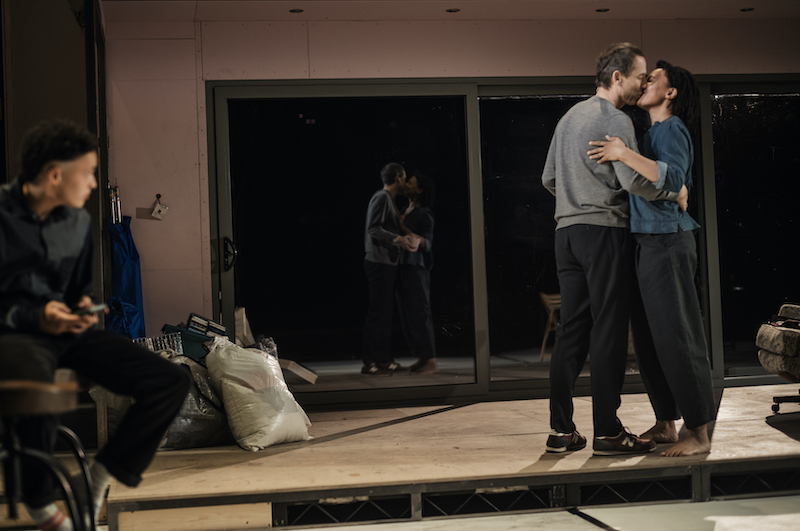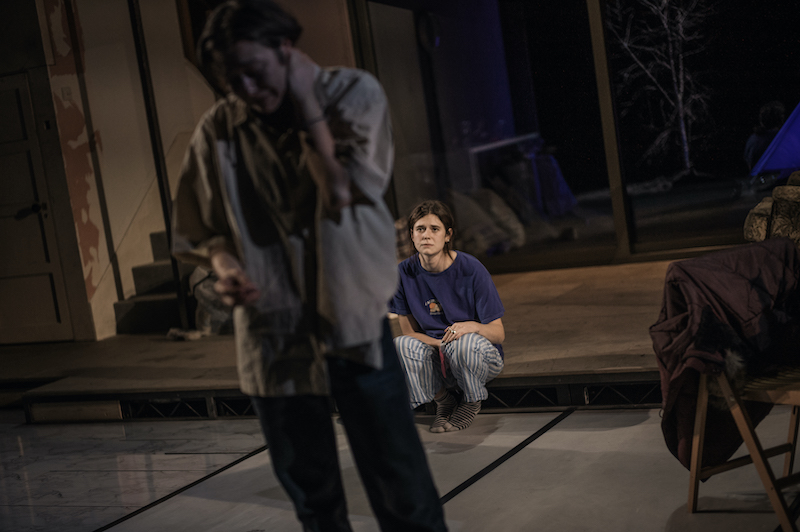Contemporary reworkings of Greek tragedy run a very particular risk, that out of context the heightened actions of the original plays – the woefully poor judgement, the copious bloodletting, the rush to disproportionate vengeance and suicide – can seem like hapless histrionics and just a bit daft.
Not so The Other Place. "Inspired" by Sophocles’ Antigone, Alexander Zeldin’s triumphant new play, which he directs, transmutes the seething passions and misdemeanours of myth into a contemporary English family home, with discomforting ease. It is strange, twisted yet terribly feasible, and utterly gripping.
Zeldin builds loosely but imaginatively on the original premise. Sophocles’ Antigone is determined to bury her dead, discredited brother, in defiance of the orders of the new king, Creon, whose response is to order that she, herself, be buried alive. Here, the conflict is not over a brother’s body, but a father’s ashes; the context is not a kingdom, but a commonplace family. Nonetheless, the repercussions are just as seismic.  Chris (Tobias Menzies) is attempting a new start for his family – wife Erica (Nina Sosanya), her child Leni (Lee Braithwaite) and his niece Issy (Alison Oliver): materially, by giving their house in the country a spanking renovation; symbolically, by finally scattering the ashes of the home’s former occupant, his late brother, who committed suicide some years before. There’s also a deep psychological need here: Chris really needs his brother out of the house. (Pictured above: Braithwaite, Menzies and Sosanya)
Chris (Tobias Menzies) is attempting a new start for his family – wife Erica (Nina Sosanya), her child Leni (Lee Braithwaite) and his niece Issy (Alison Oliver): materially, by giving their house in the country a spanking renovation; symbolically, by finally scattering the ashes of the home’s former occupant, his late brother, who committed suicide some years before. There’s also a deep psychological need here: Chris really needs his brother out of the house. (Pictured above: Braithwaite, Menzies and Sosanya)
But there’s an obstacle, in the form of Chris’s other niece, Annie (Emma D’Arcy). The black sheep of the family, after years of absence Annie has resurfaced on the night of the memorial, with a surprising demand: that her dad’s ashes never, ever leave his home. While the rest of the family looks on with nervous bafflement, the pair lock horns over the urn and its contents.
Designer Rosanna Vize’s set cutely establishes a different kind of battlefield than that of Greek myth – focused as it is on the favourite adornment of the modern bourgeois renovation, the kitchen extension. And the play’s initial phase is quite comic, as Chris and Erica alternately coo and complain over the details of their efforts, he particularly enamoured with the sliding doors that lead onto the garden, and dreams of the light that will come when he removes his brother’s beloved trees, while old friend and mediocre project manager Terry (Jerry Killick) adds a stoner’s cheery complacence about how long it’s all taken.
But the tension while they wait for Annie is palpable, references to her mental health problems hanging in the air, her uncle fuming about the prospect of her presence. When she arrives, she doesn’t disappoint – cold, distracted, exerting a diva’s manipulation over proceedings. To her family’s wishes to build a new life, Annie merely asserts that, “I don’t want to move on.”  While Zeldin adheres to his source’s themes of familial loyalty, grief, the perversion of authority, obsession, he adds some dark skeletons in this family’s closet and layers of complexity that modern audiences are now naturally responsive to, related specifically to mental illness and child abuse. Chris may ask his niece, “Are you ill again?”, but it becomes increasingly apparent that he’s not at all stable himself, and that the squabble over ashes has more to do with his and Annie’s black past.
While Zeldin adheres to his source’s themes of familial loyalty, grief, the perversion of authority, obsession, he adds some dark skeletons in this family’s closet and layers of complexity that modern audiences are now naturally responsive to, related specifically to mental illness and child abuse. Chris may ask his niece, “Are you ill again?”, but it becomes increasingly apparent that he’s not at all stable himself, and that the squabble over ashes has more to do with his and Annie’s black past.
Both D’Arcy and Menzies are exceptional as this cracked, dangerous pair. D’Arcy presents someone at once controlling and deeply vulnerable, seemingly acting on instinct and in the moment, the actor often emitting an incredible power in stillness; Menzies is a scowling, twitchy powder keg, whose reappearance in the house after going AWOL in the middle of the night brings an almost unbearable tension into the auditorium. The way their conflict progresses is shocking, disturbing, and daringly evoked.
They are well-supported, particularly by Oliver (pictured above with Emma D'Arcy) as the reasonable sister in the middle of this maelstrom, with barely any space to consider her own grief and needs, and Killick as a man whose light-hearted façade fails to conceal a loathsome personality; for people as well as buildings, facelifts can’t succeed if the foundations are rotten.
The drama takes place over one night, always in this ill-begotten extension (with doom-laden glimpses of Annie's tent outside), the action condensed into a short and ever sharper 90 minutes, Yannis Philippakis’s soundscape building an almost subliminal surge to the emotional temperature. One of the wonders of the production is that it elicits edge-of-seat drama from a scenario – centred on a family squabble over an urn – that could easily have descended into absurdity. Instead, Zeldin has conjured a novel tragedy that, despite its roots, feels horribly of the here and now.















Add comment